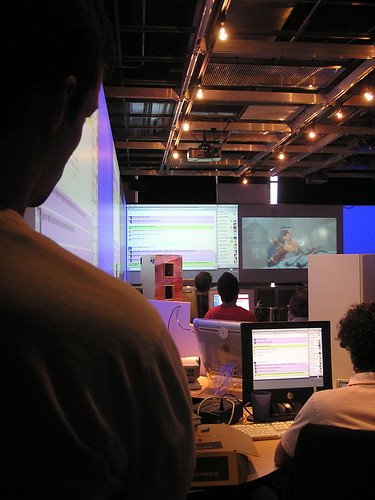Second Person

Tonight I sat in on an evening of discussion around "writing and gameplay" to commemorate the book Second Person with Noah Wardrip-Fruin, Jordan Mechner, Mark Marino, and Jeremy Douglass.
Although Mechner was there discussing the challenging of turning a videogame -- Sands of Time of the Prince of Persia series -- into a feature film devoted to more than killing monsters, he's done work that celebrates the regional and the political in his documentary Chavez Ravine. Mechner, like many of the other presenters that evening, was interested in the procedurality of a "bad choice," which in the case of completing a puzzle that activates the castle's defense system, may be your only one. The way that choice-making still remains dramatically important, even when the media is no longer an interactive one, could be seen as one way to approach the old Narratology vs. Ludology debate.
I had seen Marino's 12 Easy Lessons to Better Time Travel before, but I think his choice to combine it with course management software was a witty improvement. Obviously, as someone who sat through nine hours of Tom Stoppard's The Coast of Utopia, I have a lot of patience with nonlinear plots, but Marino's sense of humor serves the project well. As someone fascinated with chatbots going back to the "Horses of Elberfeld," I also liked the fake interactivity of his chatbot in the story "Ticky." (Marino also created monologues for the notorious Grand Theft Auto game that include an army recruiter, a driver's ed instructor, and a controlling Italian mother.)
In keeping with the "bad choices" theme, Douglass discussed the text-based interactive work of fiction "Shade," which takes place in the existential trap of an apartment. Audience member and innovative game designer Tracy Fullerton, however, talked about the problems with the game interface and its irritating protocols that make the equivalent of tying a shoe into an elaborate algorithm of discrete instructions. Douglass didn't disagree that this lack of intuitiveness could be frustrating, but he did advocate for the pleasures of this particular form of literacy. With other audience members, there was also some discussion of the much lauded "Facade," in connection with the question of whether it was a true story simulation or merely a chatbot.
Wardrip-Fruin is also hosting what looks to be a great panel with Jesper Juul and Judith Faifman at UCSD on the 18th. Info is here.
(Picture above courtesy of Jenny Cool of The Participant Observer.)
Labels: interactive narrative, MIT Press, panels, UC San DIego, USC, virtual worlds

<< Home